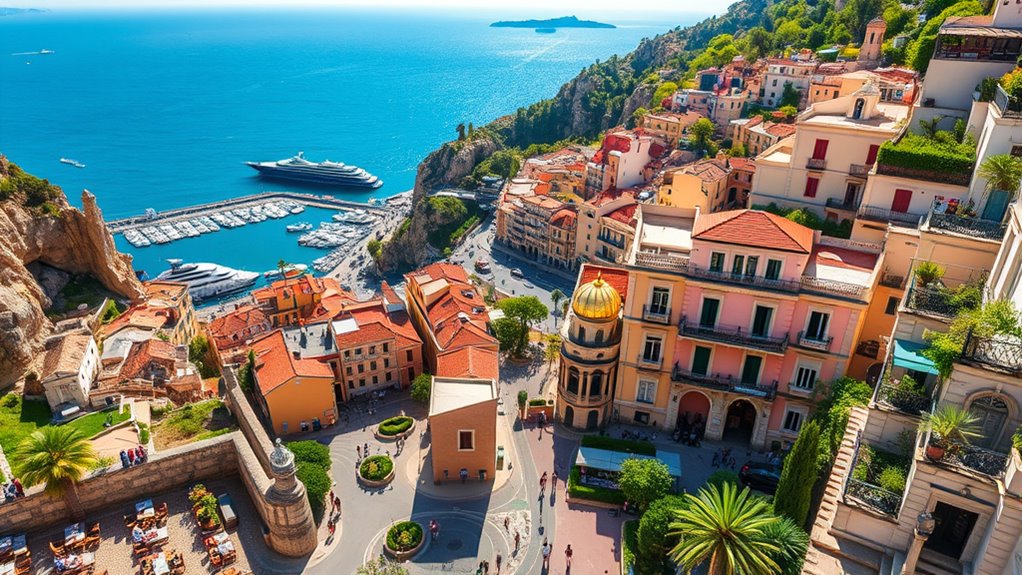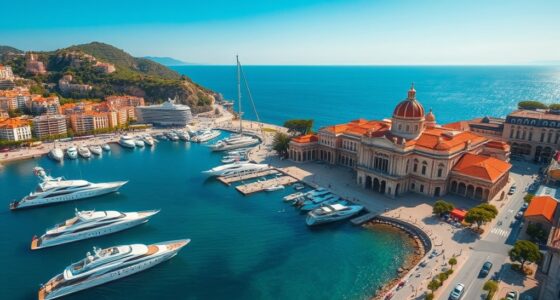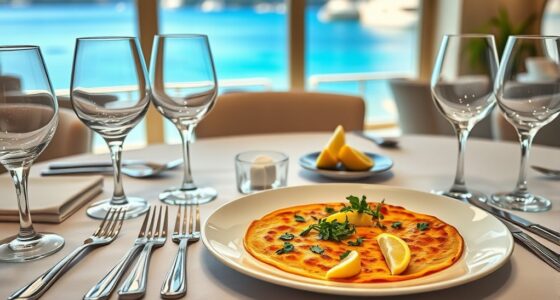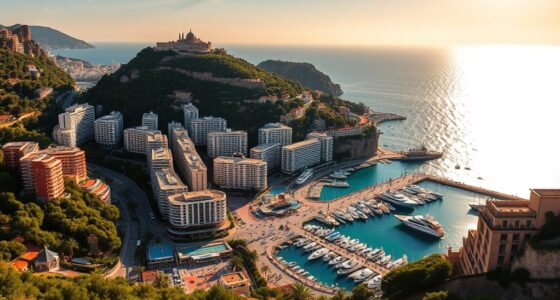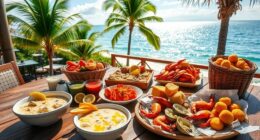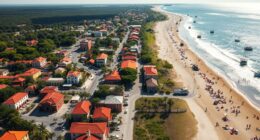Monaco’s history spans from ancient settlements and fortress-building by the Genoese to the rise of the powerful Grimaldi family, who expanded and defended its independence. Over time, political shifts and territorial changes shaped its modern state, turning it into a luxury hub known for its casinos, cultural festivals, and glamorous events like the Grand Prix. Its society blends tradition and innovation, with a vibrant arts scene and a rich heritage that continues to evolve. If you explore further, you’ll uncover even more of Monaco’s enthralling story.
Key Takeaways
- Monaco’s history dates back to the Stone Age, with significant development from Genoese fortress control in 1215 by the Grimaldi family.
- The Grimaldi dynasty expanded Monaco’s territory and established its sovereignty through diplomacy and resilience.
- Modern Monaco evolved into an international hub with economic growth driven by casinos, finance, and luxury tourism.
- Cultural traditions blend French, Italian, and Monégasque influences, emphasizing arts, festivals, and royal patronage.
- Monaco’s society is cosmopolitan, hosting world-renowned events like the Grand Prix and maintaining a rich heritage of arts and philanthropy.
Early Settlements and Fortress Construction
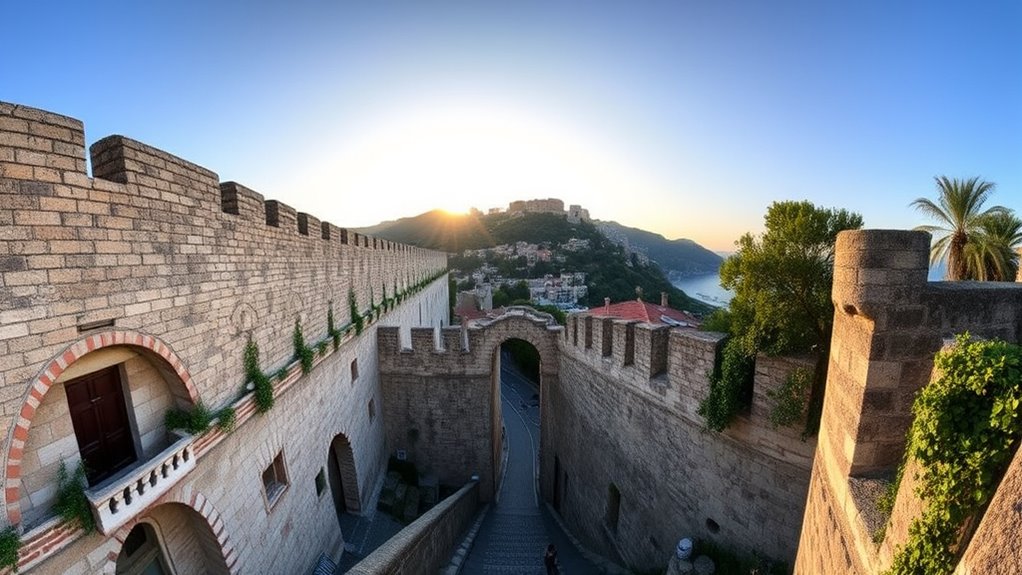
Long before Monaco became a renowned principality, evidence of early human activity shows that the area was inhabited during the Stone Age, with artifacts now displayed at the Museum of Prehistoric Anthropology. You can see remnants of these early settlements, revealing that people used Monaco’s rocky coast and strategic location to establish communities. Over centuries, it attracted various civilizations, including Phoenicians, Greeks, Carthaginians, and Romans, who recognized its importance as a port. In 1215, Genoese Ghibellines led by Fulco del Cassello built a fortress atop the Rock of Monaco to strengthen control and defend against rival factions. This fortress marked the beginning of Monaco’s political and military significance, laying the foundation for its future development.
Rise of the Grimaldi Dynasty and Sovereign Development
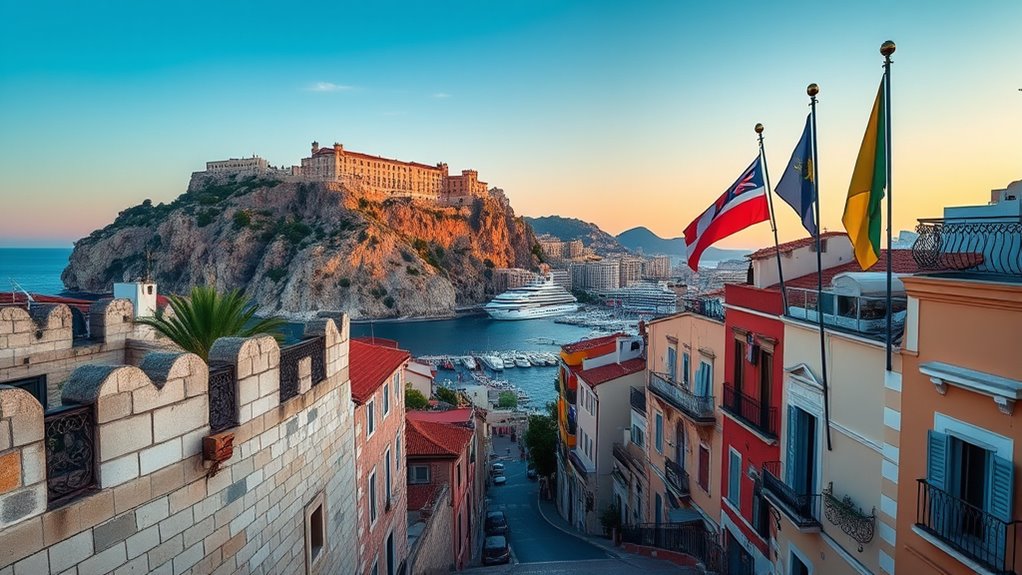
You can see how François Grimaldi’s daring takeover in 1297 marked the beginning of the family’s long-lasting rule. Over the centuries, they expanded Monaco’s territory and navigated shifting alliances to maintain independence. Today, the Grimaldi dynasty’s resilience and modernization efforts continue to shape Monaco’s sovereignty. The strategic use of diplomacy and innovation has been vital in preserving their authority through changing political landscapes.
Origins of Grimaldi Rule
Have you ever wondered how the Grimaldi family first came to dominate Monaco’s history? It all started in 1297, when François Grimaldi, disguised as a monk, sneaked into the Genoese fortress and seized control. This bold act marked the beginning of their rule. Over time, the Grimaldis solidified their power through strategic alliances and military strength, turning Monaco into a sovereign state. Their resilience kept them afloat through wars, shifting protections, and diplomatic challenges.
- They seized control with daring bravery, shaping Monaco’s destiny.
- Their leadership turned a small fortress into a lasting dynasty.
- They fought to maintain independence amid powerful neighbors.
- Their resilience ensured Monaco’s survival through turbulent times.
- Their legacy created a monarchy that endures today.
Expansion and Modernization
Following their daring conquest in 1297, the Grimaldi family focused on consolidating and expanding their control over Monaco. They strengthened their rule by acquiring nearby territories like Menton and Roquebrune, though these were later lost. Over time, Monaco shifted from external protections to asserting independence, especially after treaties with France in 1641 and 1861. You’ll see that modernization came with abolishing income tax in 1869, attracting wealthy residents. The 20th century saw stability and growth, with Monaco becoming a founding member of the UN in 1993. Today, Monaco balances its rich history with modern development, maintaining its status as a global financial hub while embracing cultural events like Formula 1. The evolution of creative practice and the integration of innovative ideas have played a part in shaping Monaco’s progressive outlook.
Political Shifts and Territorial Changes in the 19th Century
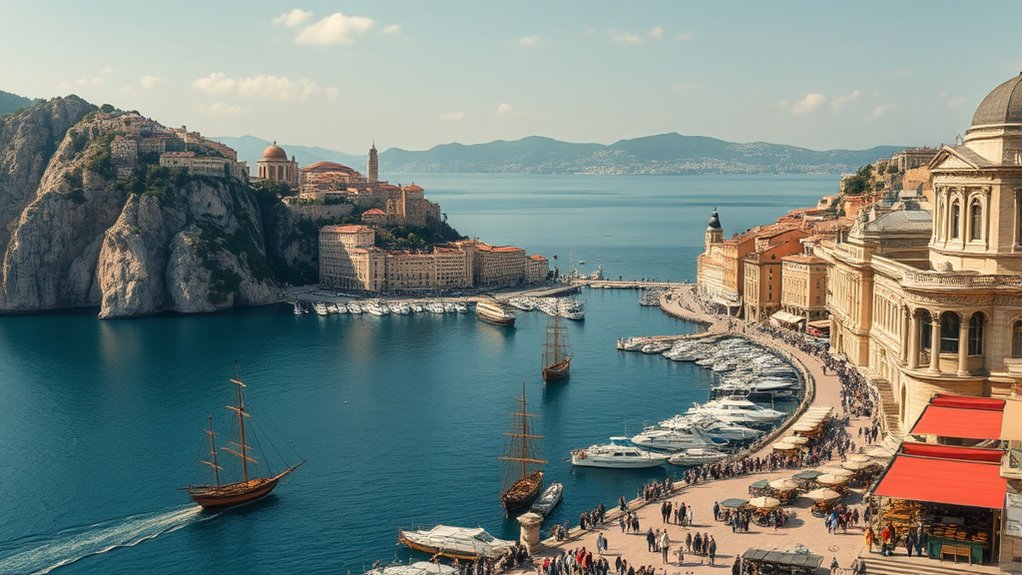
The 19th century was a period of significant political shifts and territorial changes for Monaco, marked by a gradual erosion of its independence and territorial expansion. You witness Monaco lose much of its land as Menton and Roquebrune break away, ceding to France in 1861. You see treaties solidify Monaco’s sovereignty, yet its borders shrink dramatically. The period is filled with upheaval, from Napoleon’s fall to shifting alliances. You feel the tension between maintaining independence and aligning with larger powers. National sovereignty becomes a central concern as Monaco navigates these turbulent times.
Modernization, International Recognition, and Growth
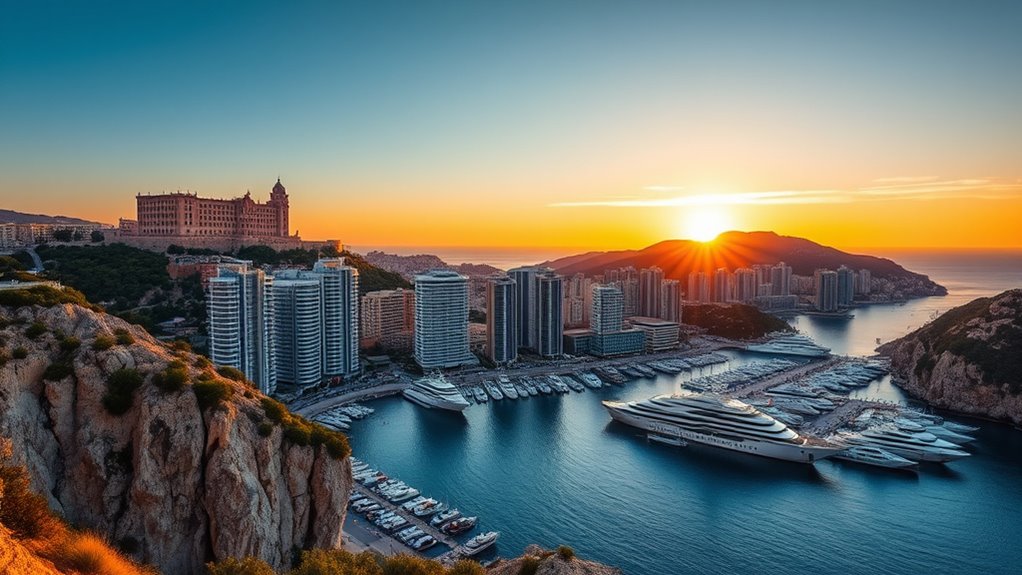
You see how Monaco has strengthened its global presence through diplomatic treaties and international organizations like the UN. Its economic growth, fueled by casino revenues and financial services, has transformed it into a wealthy hub. The country also hosts major cultural and sporting events that attract worldwide attention, showcasing its modern identity. Additionally, Monaco’s commitment to modern infrastructure has further solidified its reputation as a luxurious and innovative destination.
Diplomatic Establishments and Treaties
How has Monaco’s approach to diplomacy and international treaties shaped its modern identity? You see, Monaco strategically uses treaties to protect its sovereignty while fostering growth. Its diplomatic efforts focus on maintaining independence amid larger neighbors, building trust through carefully crafted agreements. These treaties have:
- Secured Monaco’s recognition as a sovereign state by France and the UN
- Ensured its independence with the Franco-Monégasque Treaty of 1861
- Enabled Monaco to join global organizations like the UN in 1993
- Allowed it to maintain a unique status outside the EU, preserving autonomy
- Supported its reputation as a financial hub despite increased international scrutiny
- Diplomatic strategies help Monaco navigate complex international relationships, reinforcing its sovereignty and global presence.
Through these diplomatic moves, Monaco balances tradition with modern demands, shaping a resilient identity rooted in sovereignty and strategic diplomacy.
Economic Development and Wealth
Monaco’s remarkable economic growth stems from deliberate modernization efforts and strategic international recognition. You benefit from its forward-thinking policies, such as abolishing income tax in 1869, which attracted wealthy expatriates and boosted casino revenues. The principality’s focus on financial services, luxury real estate, and tourism has transformed it into a global wealth hub. Its close ties with France, along with the adoption of the euro in 2002, enhance stability and international trade. Monaco’s reputation as a playground for the rich and famous, combined with its political stability and modern infrastructure, fuels continuous growth. As a result, Monaco maintains high levels of wealth and prestige, drawing investors and visitors worldwide while solidifying its status as a leading financial and luxury destination. Additionally, the modern infrastructure continues to support its economic expansion and appeal.
Cultural and International Events
Modernization has propelled Monaco into a vibrant hub of cultural and international events that attract global attention. You experience this energy firsthand when attending iconic gatherings that showcase Monaco’s dynamic spirit. These events include:
- The thrilling Monaco Grand Prix, where speed and elegance collide on the streets.
- The Monte-Carlo Rally, drawing adrenaline junkies from around the world.
- Prestigious ballet and opera performances at the Opéra de Monte-Carlo.
- The lively International Circus Festival, celebrating the art of entertainment.
- Exclusive charity galas that highlight Monaco’s philanthropic heart.
Through these events, Monaco asserts its position as a global cultural crossroads. The nation’s commitment to modernization and international recognition fuels growth, inspiring awe in visitors and residents alike, and reaffirming Monaco’s reputation as a spectacular destination for entertainment and diplomacy. Cultural significance plays a key role in shaping Monaco’s international reputation.
Monégasque Society, Culture, and Influences
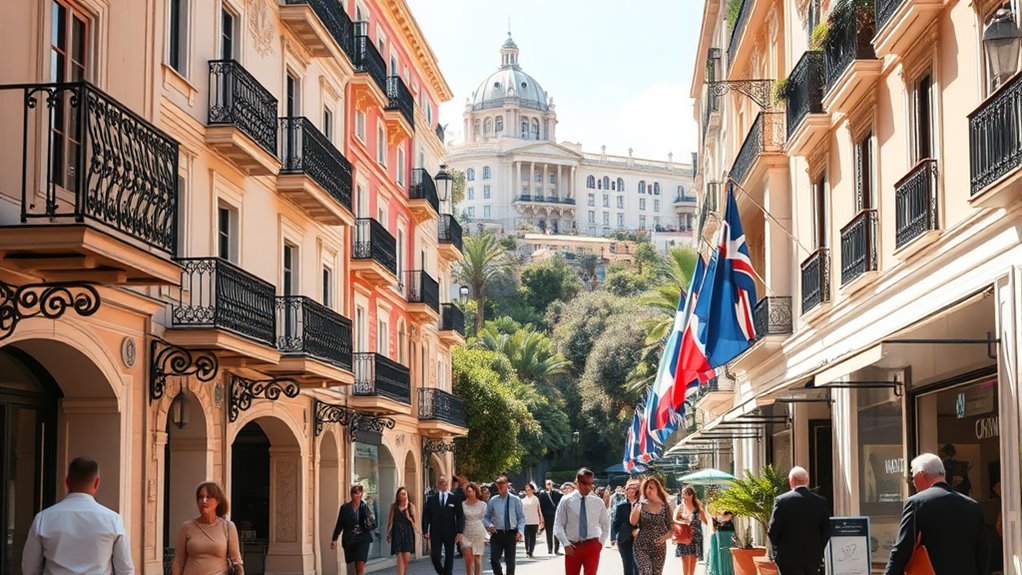
Monégasque society is a vibrant blend of influences, reflecting its rich history and diverse population. You’ll notice French, Italian, and Monégasque traditions shaping everyday life, from language to cuisine. French is the official language, replacing Italian, but both are spoken alongside Monégasque, a regional dialect. The culture emphasizes elegance, with a love for arts, philanthropy, and sporting events like the Formula 1 Grand Prix. Despite its small native population, most residents are foreigners, creating a cosmopolitan atmosphere. Royal patronage supports arts, festivals, and charitable causes, fostering a sense of community. You’ll find a society that balances its historic roots with modern sophistication, where tradition and international influence coexist seamlessly, making Monaco a cultural hub that celebrates its unique heritage.
Contemporary Monaco: Governance, Economy, and Cultural Scene
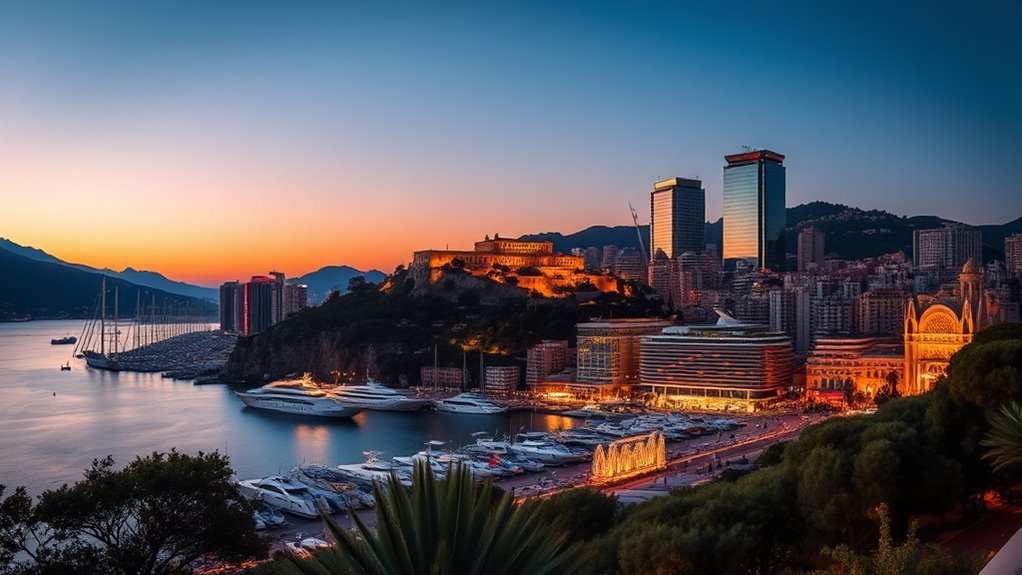
Have you ever wondered how a tiny principality maintains its influence on the global stage? Monaco’s governance combines tradition with modernity, led by Prince Albert II, whose family has ruled for centuries. Its economy thrives on luxury, with casinos, real estate, and finance, attracting the world’s elite. You’ll find a vibrant cultural scene, from the Monaco Grand Prix to ballet, opera, and art festivals. Additionally, Monaco’s commitment to cultural preservation ensures its rich heritage continues to thrive amidst contemporary developments.
Frequently Asked Questions
How Did Monaco Develop Its Unique Monégasque Identity Amid Foreign Influences?
You develop your unique Monégasque identity by blending your rich history with local traditions, despite foreign influences. You embrace your language, French, while celebrating your cultural festivals, cuisine, and arts like ballet and opera. You take pride in your heritage, supporting philanthropy and arts, and maintaining customs passed down through generations. Even with many residents being foreigners, you preserve your distinct Monégasque character through community events and a deep sense of shared history.
What Are the Origins of Monaco’s Distinctive Cuisine and Culinary Traditions?
You’ll find that Monaco’s distinctive cuisine blends Mediterranean ingredients with French and Italian influences. You can enjoy dishes like barbagiuan, a savory pastry, and stockfish, a traditional dried fish dish. Local culinary traditions develop from the region’s fishing, farming, and trade history, emphasizing fresh seafood, herbs, and seasonal produce. This rich culinary mix reflects Monaco’s diverse culture and its strategic position along Mediterranean trade routes.
How Has Monaco Maintained Its Sovereignty Despite Its Small Size?
You might find it surprising, but Monaco maintains its sovereignty through strategic diplomacy and strong international ties. Its treaties with France, like the 1918 agreement, guarantee recognition while allowing independence. The principality’s economic strength from casinos, tourism, and finance also reinforces its autonomy. By blending tradition with modern diplomacy, Monaco navigates its tiny size, asserting its sovereignty amid global pressures, and preserves its unique identity effectively.
What Role Does Philanthropy Play in Monaco’s Cultural Landscape?
Philanthropy plays a essential role in Monaco’s cultural landscape, helping support arts, education, and social causes. You’ll see royal patronage and wealthy residents actively contributing to museums, festivals, and charitable initiatives that enrich the community. These efforts foster a vibrant cultural scene, promote international cooperation, and uphold Monaco’s reputation as a generous, culturally rich society, making philanthropy a cornerstone of its identity and global influence.
How Does Monaco’s Legal System Support Its Status as a Tax Haven?
Did you know that Monaco has no personal income tax, attracting over 30,000 residents? Its legal system supports this status by offering favorable tax laws, strict banking secrecy, and flexible corporate regulations. These laws make Monaco an appealing financial hub, encouraging wealth preservation. The government’s alignment with international standards, while maintaining confidentiality, helps Monaco remain a premier tax haven, drawing high-net-worth individuals seeking security and privacy.
Conclusion
You witness Monaco’s rich history, from ancient fortresses to modern luxury. Its past is rooted in resilience and power, yet today, it thrives as a glamorous hub of culture and innovation. The contrast between its medieval origins and contemporary sophistication creates a mesmerizing rhythm. Monaco’s story reminds you that tradition and progress can coexist beautifully, shaping a unique identity that continues to fascinate the world.

